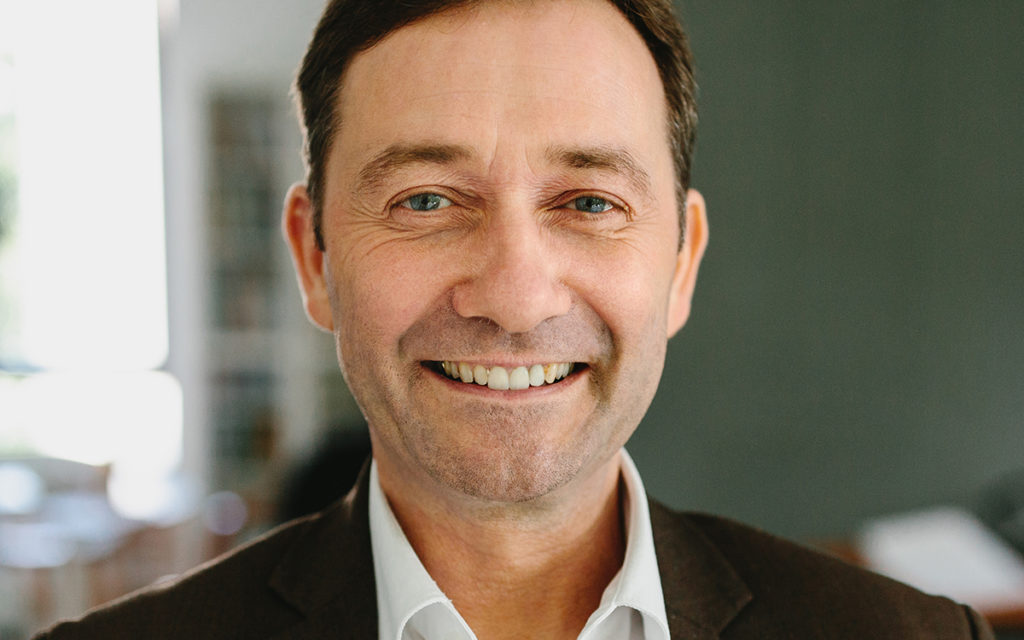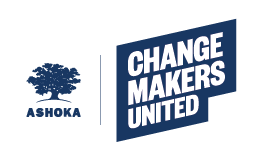News:
“Corona really made us focused”.

Like almost all companies, the Väter gGmbH had to rethink during the pandemic – but it wasn’t just a matter of becoming more digital. Volker Baisch tells us in an interview what plans there are now and how he looks forward to the coming year.
How did 2020 start for you and you as Väter gGmbH?
We got off to a flying start: At the end of January, we held the big Fathers’ Summit in Berlin, which was attended by Family Minister Franziska Giffey, among others. Even there, we sensed that the topic of fathers is becoming even more relevant in society. In recent years, fathers have become increasingly courageous, more and more wanted to attend the presentations, and we also sensed a spirit of optimism in the networks of our member companies. After the Fathers’ Summit, we also received many new inquiries from companies. Then the full brake came, as it did for many, and everyone was busy with themselves.
How did you react?
Of course, that shook us up completely at first. Then I heard about the hackathon, #WirvsVirus, which gave rise to the “Fathers in Times of Corona” page. It was the way out of the dilemma for us and the way to help fathers directly. Especially in April, we heard about excessive demands, heated arguments, separations, and sometimes violence. We asked ourselves: how do the parent couples manage this new everyday life especially with small children? The question of how they can even use the time for their partnership came only after the first lockdown. Our new information and counselling service “Fathers in Times of Corona” was in great demand right from the start – we never had such a demand before.
What questions did you hear most frequently from fathers?
The biggest challenge was readjusting as a couple, adjusting to each other 24 hours a day. Communication became the most important issue – for many this was unfamiliar, because the roles and everyday life had been rehearsed for years. Traditionally, it is unfortunately still the case that 80 percent of the men are the family breadwinners in the family. It was therefore clear to us very quickly that many fathers needed support. Many were also concerned with the issue of the right boundaries: Where does work begin, where does it end? How can home office work over five days? Where does family life begin?
It sounds like you guys did a lot of redevelopment.
We have completely changed many of the planned presentation topics. Not only did we switch everything to digital – we also added new topics. Like the topic of couple communication. As Väter gGmbH, we have re-planned the year on the fly. In the past few months, I’ve worked harder than ever before, sometimes even 60 hours a week. Me, of all people, who always preaches balance. But it was such a special situation and we also had to take care of our own transformation.
In the spring you also became part of Changemakers United. What did that do for you?
We were very happy and it made me realize what great opportunities we have – despite or even because of the pandemic – to spread our topic. In March, we were still very busy with ourselves, building the site and wondering, like many, how we could continue. With Changemakers United, there was an immediate sense of optimism in the team and the opportunity to make our site better known, as we received support from pro bono partners.
To what extent was there also an opportunity in this period?
A lot of surveys were published, especially on the distribution of tasks between mothers and fathers. We also initiated surveys ourselves, including a couple study that will be published in February. The bottom line is that Corona is now offering parent couples and fathers in particular the opportunity to develop a way of working together as a couple. There has rarely been such an open window in recent years to try out new things and thus transform one’s own father or couple role. We are currently experiencing this in the member companies of the Fathers’ Network. Fathers have suddenly become more visible, and superiors have noticed: Oh, he has a family.
Like the politics professor Robert Kelly, who was on Skype for an interview with the BBC – and suddenly his daughter was in the picture.
At that time, many still laughed at him, according to the motto: Why does he react so hectically?! Now it’s nothing out of the ordinary. One would simply say to the child: I’m working right now. And then continue to work or put the child on your lap. Corona has also brought about this positive change: children come into the company through the screens. And: There will be no turning back, because 70 percent of fathers want to continue working one to three days a week in a home office, and 35 percent are increasingly thinking about part-time work. The change is already happening.
If you now look back at 2020 – what is your conclusion?
2020 started brilliantly – and it’s ending brilliantly. Since October, we have received 30 inquiries from companies, most of which came through recommendations and our network. We’ve never had so many before. And almost all the companies we already work with trust us and have stayed in the network. It’s crazy how what we had hoped for at the beginning of the year is now suddenly a reality. I’ve never started a new year with such optimism and clarity.
2021 is also the year you celebrate your tenth anniversary of the Fathers’ Network. What has happened since your founding in terms of fathers, parenting and parental leave?
In 2011, we launched our first program with three companies. We have always been – and still are – the pioneers in the area of reconciliation and fathers. That’s certainly one of the reasons why couples who share parenting and care equally are still in the minority. Of course, we have some DAX companies in our portfolio, and the number of fathers employed by our member companies is in the hundreds of thousands – but there is room for much, much more. Especially in the area of small and medium-sized companies, for which we have now also developed a special offer.
Why is progress so slow?
When we started in 2011, the topic of diversity gradually came up. I was pleased about that: Great, fathers and mothers think the family project together after all, I thought. But quickly it was said: no, no, the money is meant for the advancement of women and not for the family-oriented men. Then in 2013 that slowly changed and the requests increased. In 2015, when parental allowance was expanded with Elterngeld Plus and partnership months were introduced, the tide turned. Since then, we have seen a steady increase in new companies – including more and more large administrations and the first small and medium-sized companies that recognize that modern fatherhood is an important criterion for retaining and recruiting the best employees, especially among many young fathers today.
The pandemic has presented families and couples with new challenges – and prepared new paths. What changes have there been internally at your company?
Over the past few years, we’ve done a lot of projects with ministries and conducted some studies. Since we have always been the pioneers in the field of fathers, these projects were important for the further development of our services. Of course, we knew that fathers are just as important as mothers in parenting – but we needed numbers, data, facts. And of course, we wanted to know how we could increase the impact of our offerings in the companies.
And the difficult moments that Corona also brought, and still brings, didn’t dissuade you?
No, even though the year was a roller coaster ride of emotions. Despite a KfW loan we had to take out and without which we wouldn’t have made it through the summer, we stuck with our decision: Focus on scaling the Fathers’ Network and stop taking on new ministry projects that have sucked up a lot of time in the past. Corona has really focused us. In the future, we will focus exclusively on businesses and political lobbying in Berlin. For 2021, we have now set all the course to lend more weight to the voices of fathers and to make it clear to the social decision-makers that the advancement of women is only really effective when men are also brought on board. Social transformation will only work if we work together – the pandemic has also made this clear.
What about the fathers who work in small and medium-sized companies?
Yes, it is important to also address SMEs and smaller companies with offers, because the issue of fathers is not an issue for large companies. After all, small and medium–sized enterprises employ more than 60 percent of the working population. What we are also planning are offers for craft associations. The digital transformation in companies has given us as Väter gGmbH a lot of tailwind and completely new opportunities. What can be said: Corona has offered us a great many opportunities – and we have taken advantage of them.

